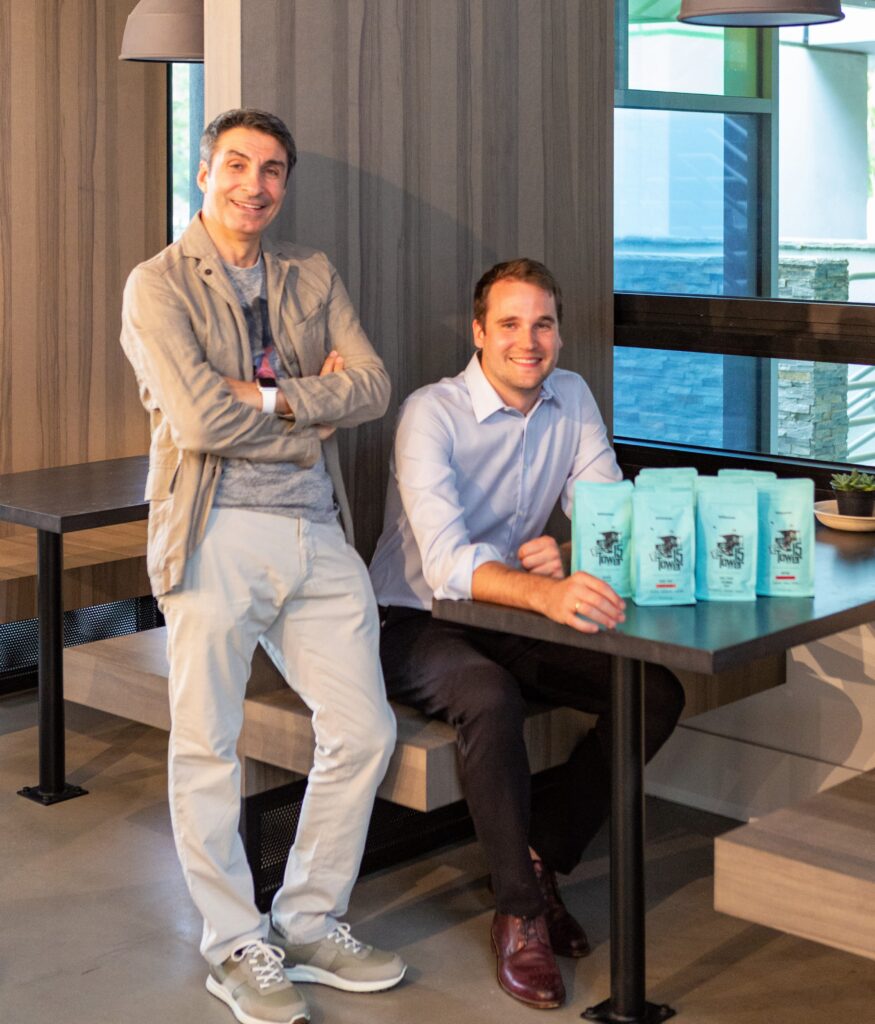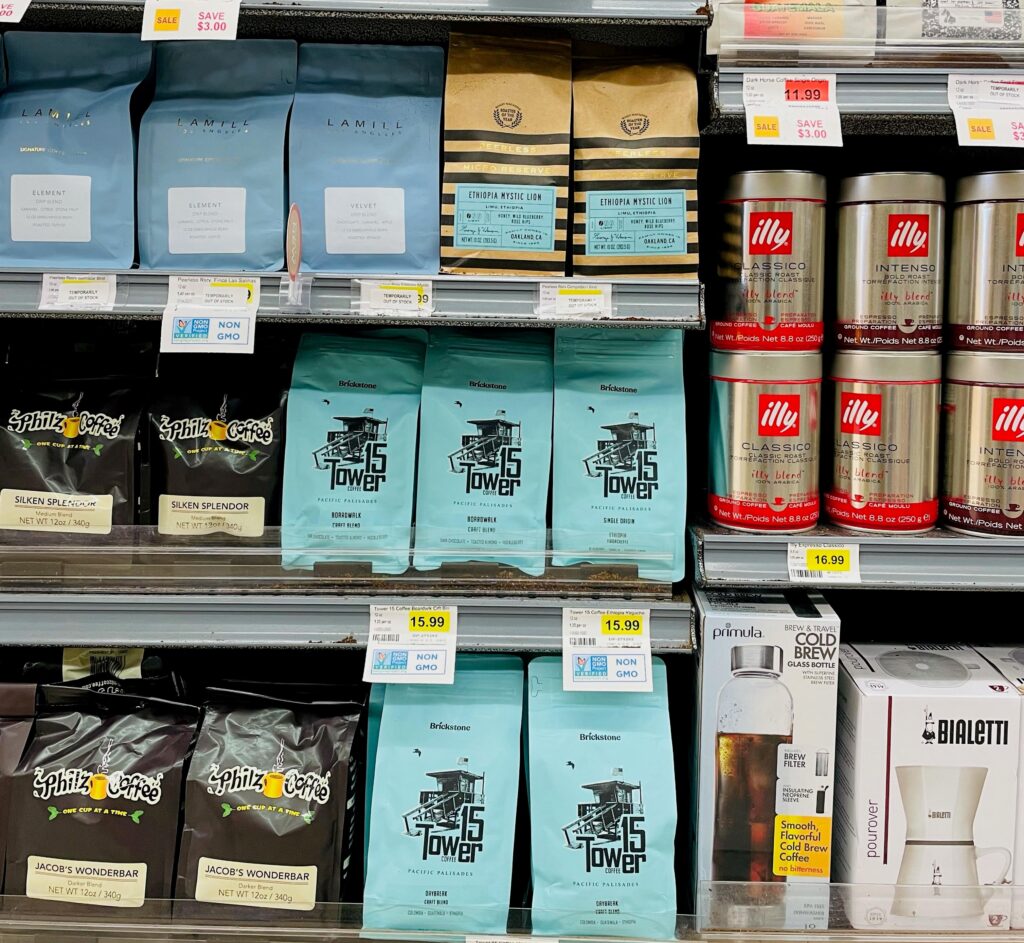
Isaac Kaplan and Jacob Spooner have started roasting Tower 15 coffee beans. The beans are now carried at Gelson’s.
Cup of Joe, dirt, mud, java, brew, cuppa, brain juice, liquid energy or just plain “coffee,” has been called the most popular beverage in the world, with more than 400 billion cups consumed each year in the United States. Coffee is grown in more than 50 countries in South and Central America, Asia, Africa and the Caribbean.
Now Estate Coffee fans may have noticed a new brand, Tower 15 Coffee, displayed in the windows at the popular coffee shop on Via de La Paz (across from Palisades Elementary).
One customer came out the door carrying a bag of beans and told Circling the News, “It’s the best coffee you can find.” That has been the typical reaction from locals who have tried it.
The coffee beans, in a turquoise bag, will now be carried at Gelson’s and are in the “pipeline” to be sold at Erewhon and Whole Foods.
Over a cup of great coffee, Circling the News recently spoke with Jacob Spooner, Estate Coffee store manager, and Isaac Kaplan, owner of Brickstone Group, about the origins of these new beans.
“The focus is on small lots – and quality is everything,” said Kaplan, who admitted he didn’t start drinking coffee until he was in his 40s. He, his wife and kids have lived in Pacific Palisades since 2008. “As I started exploring, I found that there were not that many good brands.
“I started chasing good coffee in the Los Angeles area—and across the country,” said Kaplan, who has traveled with his family in an airstream, visiting different states. “Everywhere it was hard to find. I decided I wanted to get into coffee.”
Kaplan, who lives close to Estate, started the coffee conversation with Spooner in 2019. At the time the shop was using “Equator” beans. Kaplan wanted his company, Brickstone Group, Inc. to be a leader in healthy food manufacturing and distribution, starting with coffee.
Spooner agreed to consult, but then the 2020 pandemic struck, and his typically busy coffee shop had to contend with L.A. County shutdowns that made retail a nightmare challenge.
There’s a thin profit margin if expensive coffee beans are used and Estate had to keep upper-end beans, while not sacrificing quality.
One way of working with costs is to buy beans directly and roast them.
Spooner and Kaplan explained that green coffee beans are imported (mostly to massive warehouses in Oakland) and rated on a scale up to 100. They are purchased by companies that do the roasting and the subsequent prices range from $2 to $6 a pound, with certain specialty coffees priced even higher.

Consumers can find Tower 15 Coffee beans at Gelson’s.
“The majority of retail coffee consists of beans that are premium, exchange, and standard grade. These are rated below 80, which is the threshold for premium coffee” Kaplan said. “The least expensive is used in cheap ground coffees, the second wave is used by big coffee chains, and the third wave, graded 80 and above, is in specialty shops, like Estate Coffee.”
Kaplan learned that different kinds of coffee beans are dependent on growing conditions, including climate, humidity and soil, which have an effect on its aroma and flavor.
“Beans are like the DNA of a soil; they have their own fingerprint,” Kaplan said, noting that “African beans carry more acidity,” which is why they are sometimes balanced with a bean from Latin America.
And of course, coffee has a growing season, so one of your top bean choices may not be available year-round.
Some green beans can be stored for up to a year after harvest without going stale. Roasted beans, however, start to lose their flavors and aromas after just several weeks.
Spooner and Kaplan acquired high-quality green beans from private organic all-natural farms around the world and roast locally in a certified organic facility. The two now spend one day a week roasting and another day sampling.
“We have complete control over the product from labels to beans to roasting,” Kaplan said. “We don’t outsource anything.”
Kaplan also told CTN that some beans that are sold as dark, are actually just “burned.”
“It takes away the flavor,” he said, noting that the darker the coffee, the less the caffeine.
Kaplan, who sold his industry-leading telecom tech company last year so he could focus on this venture, said that one “has to be careful and roast in such a way that it brings out the best flavors. I don’t want to copy anyone; it must be original.”
Spooner notes that his coffee partner is insistent on everything being top-notch. “The one thing I’ve learned from Isaac is zero compromise.”
“I will never compromise on the quality of beans and their flavor,” said Kaplan, who explained that the idea for the bag’s color came from his 14-year-old daughter Nicole.
“You have to be careful in roasting in such a way to bring out the best flavors.”
The bags are lined with aluminum and have a hole for the carbon dioxide to escape, but to prevent the oxygen from entering, which ensures the freshness.
The two men believe that Tower 15 is considered an iconic beachside location in Pacific Palisades and the perfect name for a unique product that brings the best green coffee beans from private-owned farms around the world to Los Angeles.
Locals are thrilled with the beans. “People love it,” Spooner said. “We like to say we have a blend or origin that people of all ages can enjoy. They also like that the packaging is something familiar to them.”
Kaplan founded Brickstone Group, Inc. in 2012 with a mission to bring quality natural products from private-owned farms and manufacturers directly to consumers and the most innovative markets. (Visit:tower15coffee.com)
